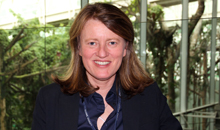Helen Margetts ,
You've had ties with the IDP Conference for almost a decade through your work with the UOC and the IN3, the University's Internet Interdisciplinary Institute.
The first time I spoke at the conference was in 2009, but I was a visiting professor at the IN3 in 2010 as a result of a collaborative arrangement between the institute and the OII.
The internet and social media are changing our relationship with the world. How have they affected our relationship with politics?
Social media are part of our everyday lives and they enable us to make 'micro-donations' of time and effort to political causes, by sharing, 'liking', downloading, uploading, tweeting, retweeting, or signing a petition, for example. As a result, groups of society that we think of as uninterested in politics, young people, seem to be engaging with politics in new ways. And these small contributions can scale up to large-scale mobilizations and major protests, as we've seen in Spain and other countries. It's something that's happening in democratic and authoritarian states alike, where we've witnessed waves of protests that don't appear to follow the same patterns as those of the past.
Numerous initiatives that hinge on participation are launched via platforms such as change.org in Spain. Have we come to think we can change the world by simply clicking a button?
Well, one click won't change the world, but a million clicks might. There are numerous examples of campaigns started on change.org that have been successful in bringing about policy change. Still, it's very important to remember that the vast majority of campaigns meet with failure. Take petitions for example. Statistically, 95% of petitions receive less than 500 signatures, 99% receive less than 10,000, and 99.99% fail to reach the 100,000-signature mark.
Might participation via a mobile or a computer cause people to become detached from reality, to not realize that they're participating in the real world?
I don't think there's any difference. Participation via social media is part of reality.
You've come up with the term 'chaotic pluralism' to define this whole situation. What does that concept involve?
The notion of chaotic pluralism is based on the idea of people making small-scale contributions to political campaigns via social media, which can scale up to large-scale mobilization. Because there are many different kinds of groups and collectives involved, this politics looks a bit like pluralist political systems of the past, based around multiple groups rather than a concentration of political power in any one body or institution, as some political theorists, such as Robert Dahl, characterized the US political system. But this kind of pluralism is much more disorganized and individualized than those theorists envisaged. It's interconnected, unstable, unpredictable ? chaotic, in fact. In this way, political life is a bit like the weather, which is the archetypal example of a chaotic system, in natural science terms.
Could political scientists and sociologists predict people's reactions in the same way as meteorologists can predict the weather?
All political activity that takes place via the internet and social media leaves a digital trail, and these trails can be harvested to generate so-called 'big data'. This is a new kind of data for social science, more like the kind of data that natural scientists have, and it offers new possibilities to apply the models of natural science to social and political behaviour. So yes, we might be able to develop the capability to predict political behaviour in the same way that meteorologists predict the weather. This is a new kind of social science though, and we are only at the start of being able to do so.
Many revolutions and protests of the kind we've been discussing begin without leaders. What do you think about that?
It's now possible for protests, mobilizations and even revolutions to gain momentum without obvious leaders emerging or traditional forms of organization, although we shouldn't forget that most of them fail. That absence can be a problem for long-term sustainability. For example, you could argue that one reason for the failures of the revolutions in Egypt and Tunisia was the lack of political parties, institutions or leaders waiting in the wings, which is why the only long-standing organized group, the Muslim Brotherhood, was able to gain so much power in the early days.
Could increased participation be said to be changing the bases of current political systems?
These movements do represent a major challenge for contemporary political systems. Political leaders don't really know what to do about them or how to react. Governmental organizations and policymakers are out of touch with the new reality of social media. Many political debates and discussions are taking place in forums in which governments aren't represented, causing a disconnect between governmental institutions and public opinion.
Research in this field involves using a lot of data generated online. Do you think we urgently need to establish a new ethical framework for the appropriate use of such data?
Yes, undoubtedly. Every act of political participation generates data; indeed, every instance of social, political and economic interaction does. If we want to use this data for research to understand political behaviour, then of course we need a new ethical framework. It's crucial. Our research teams need to be multidisciplinary to use this kind of data, including natural scientists as well as social scientists. But natural scientists, who deal with particles and atoms, haven't faced the same ethical challenge as we do when the data concerns people with digital rights to privacy and data protection. We therefore also need to include philosophers in our research teams to help us define limits and develop an ethical framework for the use of this kind of data.
Press contact
-
Editorial department

